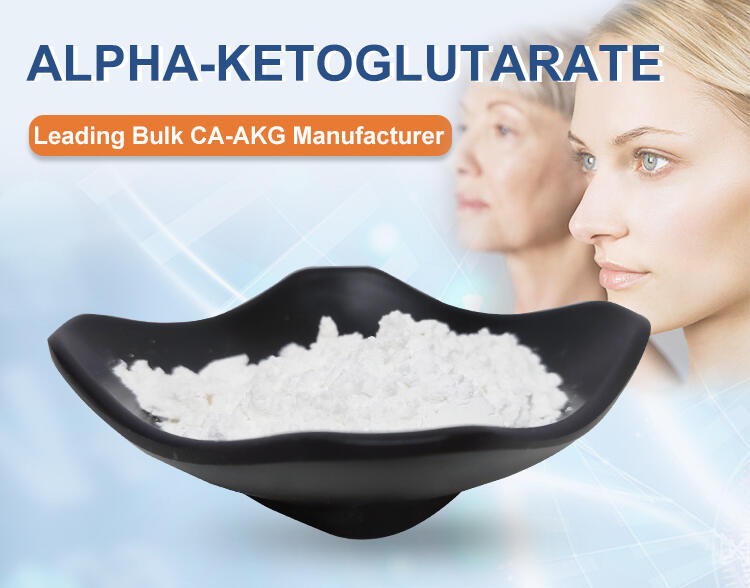Is AKG anti-aging?
Aging is an inevitable part of life—but science is increasingly discovering ways to slow it down, mitigate its effects, and possibly even reverse some aspects of it. One of the emerging contenders in the anti-aging arena is Alpha-Ketoglutarate (AKG), a naturally occurring compound that plays a pivotal role in the body’s energy metabolism and cellular health. Over the past few years, AKG has attracted attention not just for its role in the Krebs cycle but also for its potential to extend lifespan, improve healthspan, and promote youthful vitality.
In this blog, we’ll explore the science behind AKG, how it works as an anti-aging supplement, the research backing its benefits, how to use it safely, and what you should know before incorporating it into your longevity regimen.
What is AKG (Alpha-Ketoglutarate)?
Alpha-Ketoglutarate is a key intermediate in the Krebs cycle (also known as the citric acid cycle), which is a crucial biochemical pathway that converts nutrients into energy within the mitochondria of cells. Chemically, AKG is a five-carbon dicarboxylic acid that serves multiple roles in metabolism, including:
- Energy production
- Amino acid metabolism
- Nitrogen transport
- Antioxidant activity
AKG is found naturally in the body and also in foods like red meat, dairy, and some vegetables. However, endogenous levels of AKG decline significantly with age, and by the time we reach middle age, levels can drop by as much as 90%. This has led researchers to question whether supplementing with AKG could help restore youthful metabolic processes and slow biological aging.

The Role of AKG in Aging
AKG is involved in several biological pathways that are closely linked to the aging process. Let’s take a look at how it influences some of the hallmarks of aging:
1. Mitochondrial Function
As we age, our mitochondria—the "powerhouses" of cells—become less efficient. AKG supports mitochondrial energy production by facilitating the Krebs cycle, helping cells produce ATP more efficiently.
2. Epigenetic Regulation
AKG acts as a cofactor for dioxygenases, enzymes involved in DNA and histone demethylation, which are key to epigenetic regulation. These enzymes maintain proper gene expression and are essential in preventing age-related epigenetic drift
3. Reduction of Inflammation
Chronic low-grade inflammation, or “inflammaging,” is a hallmark of aging. AKG has been shown to suppress the NF-κB pathway, a central player in inflammation. Studies have also reported lower levels of IL-6 and TNF-alpha (inflammatory cytokines) in AKG-treated animals.
4. Autophagy and Cellular Cleanup
AKG has been shown to promote autophagy, the body’s internal cleanup system that removes damaged proteins and organelles, reducing the accumulation of cellular waste that contributes to aging.
5. Stem Cell Function
Recent studies suggest that AKG helps maintain stem cell vitality, crucial for tissue regeneration and repair, both of which decline as we age.

Scientific Studies on AKG and Longevity
The potential anti-aging benefits of AKG are backed by emerging preclinical and clinical research.
1. Lifespan Extension in Mice
A landmark 2020 study published in Cell Metabolism by the Buck Institute for Research on Aging found that Calcium Alpha-Ketoglutarate (Ca-AKG) extended the lifespan of mice by up to 16.6% and increased their healthspan significantly. Notably, these mice also had:
- Lower frailty scores
- Reduced inflammation
- Improved physical function
Importantly, the treated mice did not just live longer—they lived better.

2. Biological Age Reduction in Humans
Pioneering biotech company Ponce De Leon Health conducted a human clinical study using their Rejuvant® supplement (containing Ca-AKG). Preliminary results indicated that daily supplementation reduced biological age by an average of 8 years, as measured by DNA methylation markers.
While this is an observational study and more rigorous trials are needed, the findings are promising and support further research.

Health Benefits of AKG Supplementation
In addition to potential longevity effects, AKG supplementation may offer a range of health benefits:
Improved Muscle Health
AKG helps in amino acid synthesis and nitrogen balance, both essential for maintaining muscle mass. This is particularly relevant for older adults at risk of sarcopenia (age-related muscle loss).
Enhanced Bone Density
AKG has been shown to promote collagen synthesis and mineralization, potentially improving bone density and reducing the risk of fractures.
Better Skin Health
Due to its role in collagen production and antioxidant effects, AKG may support skin elasticity and resilience.
Gut Health
AKG can serve as an energy source for intestinal cells and has been used in clinical settings to support gut integrity, especially after surgery or trauma.
Cognitive Support
Although less studied, AKG’s role in reducing systemic inflammation and supporting mitochondrial health may have neuroprotective effects that benefit cognitive function.

How to Use AKG for Anti-Aging
Forms of AKG
The most common and bioavailable form for supplementation is Calcium Alpha-Ketoglutarate (Ca-AKG), which has shown the strongest results in longevity studies.
Other forms include:
- AKG Ethyl Ester – faster absorption but less studied
- Arginine Alpha-Ketoglutarate (AAKG) – more popular in sports nutrition
Recommended Dosage
There’s no official recommended daily intake, but human studies have used:
1,000 mg to 3,000 mg per day of Ca-AKG
Typically taken in the morning, on an empty stomach
Always start low and monitor your response.
Stacking AKG with Other Longevity Supplements
AKG can be paired with:
- NAD+ boosters (NMN or NR)
- Fisetin or Quercetin (senolytics)
- Resveratrol
- Mitochondrial antioxidants like CoQ10 or PQQ
Be sure to consult with a healthcare provider before combining supplements.


Safety, Side Effects, and Considerations
AKG is generally well-tolerated.
It has been used safely in medical nutrition for decades, especially in patients with kidney issues or recovering from surgery.
Potential side effects may include:
Mild GI discomfort
Nausea
Headache (rare)
Who Should Be Cautious?
- Pregnant or nursing women (due to lack of safety data)
- People on blood pressure or kidney medications
- Those with metabolic disorders or cancer, since AKG may influence cell growth

Conclusion
Alpha-Ketoglutarate is not a miracle pill—but the science suggests it holds genuine promise in the field of longevity and healthy aging. By targeting multiple aging pathways—epigenetic regulation, mitochondrial health, inflammation, and autophagy—AKG offers a multi-pronged approach to preserving youth and vitality.
While more human studies are needed, early data from animal research and initial human trials are encouraging. As part of a holistic longevity protocol that includes exercise, nutrition, sleep, and stress management, AKG may help us not just add years to life, but life to years.



